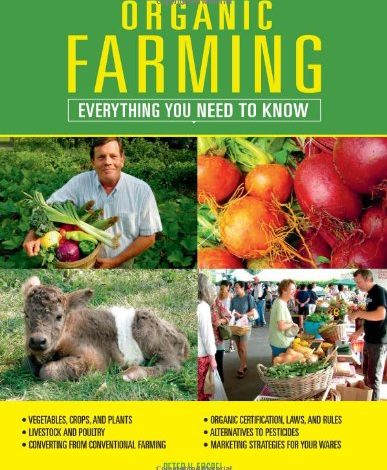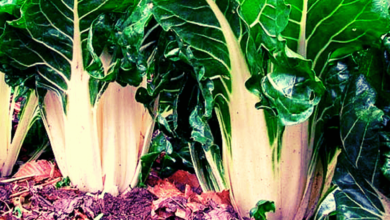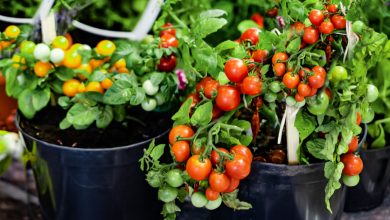What is Organic Farming: Everything you need to know

Today we are very familiar with terms that end with the adjective “ecological”: organic food, organic packaging, organic tourism, organic farming… But… do we really know what the term Organic Farming means? Would you be able to explain what «organic farming» is or what the goals and benefits of this type of farming are?
Is yours really an «ecological garden»? If you have your doubts, with this article we will try to make them disappear.

History of Organic Agriculture
In reality, the principles of Ecological Agriculture or Organic Agriculture (which are the same) have been put into practice for centuries: our ancestors paid attention to ecological techniques such as crop rotation or association, and did not use hundreds of artificial chemicals or genetically engineered seeds. modified. But they did not do it because they had not yet appeared, so it can be said that the ecological movement, as we know it today, did not arise centuries ago but about 50 or 60 years ago.
It all started in the late 1940s thanks to the opposition of a few people to the so-called Green Revolution and the use of chemical fertilizers, pesticides and genetically modified plant varieties. These practices typical of what is now called conventional agriculture have negative consequences on the fertility and structure of the soil, biodiversity, the renewal of natural resources and the conservation of the environment.
Since the 1960s, a broader part of society began to worry about the damage, many of which are irreversible, caused to the environment by the practice of intensive agriculture. In the 1970s and 1980s, awareness of agroecological issues continued to rise among farmers and consumers.
In the 90s, organic farming experienced a great boost to the point where we are now, where there are few people who have not heard of it. This boost was also due to society’s concern for health, and the attempt to improve it through a healthier and less artificial diet, thanks to the consumption of organic food.
Objectives of Organic Farming
Practicing Ecological Agriculture does not only imply the use of adequate agricultural techniques, its objectives also cover the social sphere (food self-sufficiency, independence and autonomy of families, local development, leisure…), environmental (stop pollution, increase biodiversity, stability of natural resources…), economic (equality, viability of farms, sustainable yield…) and cultural (conservation of traditional techniques and foods).
Some of the objectives of organic farming are:
- Avoid the use of toxic or polluting products for the soil, fauna, flora, or for people.
- Use renewable energy sources and properly combine all available resources.
- Control pests and diseases using ecological methods and prevent their appearance through continuous prevention.
- Build and maintain the fertility of the soil and its microfauna (fungi, bacteria and other beneficial microorganisms) using cultivation techniques that prevent the depletion of the substrate and maintain the levels of nutrients and organic matter.
- Stop the degradation of the soil structure and its erosion.
- Allow the obtaining of income that allows an adequate standard of living.
- Produce enough healthy food, free of artificial substances and of high organoleptic quality.
Main organic farming techniques
As you can see, the objectives of Organic Farming are many, therefore, the tasks that you will have to carry out if you practice it will also be.
Not because you have an urban garden in your patio or on your balcony you will be producing organic food.It is not worth using any product or any technique if what you want is a true organic garden, and this happens because you take into account a series of good practices:
- Perform adequate fertilization to improve soil stability without compromising the health of plants or ours with artificial chemicals and not allowed in organic farming. You should use products such as compost, green manure, manure, earthworm humus (vermicompost), mulch, mushroom compost, liquid organic fertilizers or some natural mineral fertilizers allowed in Organic Farming (if you have purchased the product, make sure it is suitable for growing ecological). In addition, combining them with techniques such as mulching or soil padding, will improve the quantity and quality of available nutrients.
- Integrated fight against pests and diseases.
- Increase biodiversity (diversity of species). If we grow several types of plants, we also favor an increase in the diversity of the microfauna (insects, microorganisms…).
- Crop rotation and the association of compatible plants are good ecological practices that have many advantages, among others the increase in biodiversity and the prevention of pests and diseases (I recommend that you read the articles to which these links redirect you).
- Use of seeds that are not genetically modified and that do not have antibiotics or any artificial substance incorporated and, if they are local varieties, much better.
- Water saving and recycling. Planning irrigation and using the right techniques (such as making a pond or installing drip irrigation, which minimizes water consumption) can help you in this task.


![Photo of Kiwi Cuttings: [Grafts, Time, Rooting and Planting]](https://www.complete-gardening.com/wp-content/uploads/2022/08/kiwi-cuttings-grafts-time-rooting-and-planting-390x220.jpg)

